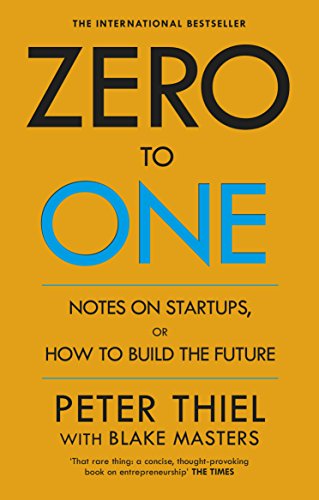Zero to One: Notes on Start Ups, or How to Build the Future Link to heading
Summary Link to heading
“Zero to One: Notes on Startups, or How to Build the Future,” written by Peter Thiel with Blake Masters, is a guide focused on entrepreneurship and innovation. Thiel, co-founder of PayPal, presents the idea that progress can be achieved by creating something new, moving from “zero to one,” rather than merely competing in existing markets. The book emphasizes the importance of breaking away from competition, building monopolies to innovate effectively, and adopting a unique approach rather than following trends. Through a series of lectures, personal anecdotes, and philosophical insights, Thiel lays out his vision for successful startups and outlines fundamental principles for entrepreneurs looking to build a transformative and lasting company.
Review Link to heading
“Zero to One” has been well-received for its thought-provoking and contrarian perspective on startups and business strategy. Thiel’s insights into fostering innovation and creating unique value distinguishes the book from other entrepreneurship literature. Its strengths include its clear articulation of complex ideas, strategic depth, and personal industry experiences shared by Thiel. However, some critics feel that the book’s philosophical approach might lack detailed practical guidance for new entrepreneurs. Additionally, the heavy emphasis on monopolistic strategies and certain economic viewpoints have sparked debate among readers and experts.
Key Takeaways Link to heading
- Unique Value Creation: Success stems from creating unique products or services that progress from “zero to one,” offering something new rather than copying existing models.
- Monopolistic Advantage: Building and maintaining a monopoly enables innovation by offering a stable platform for long-term planning and investment.
- Secrets and Knowledge: Exploration of the unknown is crucial for innovation. Discovering and capitalizing on “secrets” that others overlook can provide a competitive edge.
- Thinking for the Future: Entrepreneurs should focus on building for the long-term future, not just immediate trends.
- Contrarian Thinking: Challenge existing paradigms and think differently to stand out in the startup landscape.
Recommendation Link to heading
“Zero to One” is highly recommended for aspiring entrepreneurs, business leaders, and anyone interested in innovation and technology. Readers looking to cultivate unique, strategic thinking away from mainstream business practices will find this book particularly valuable. Its insight into future-oriented entrepreneurship makes it a compelling read for those aiming to create significant and lasting change within their industries.
